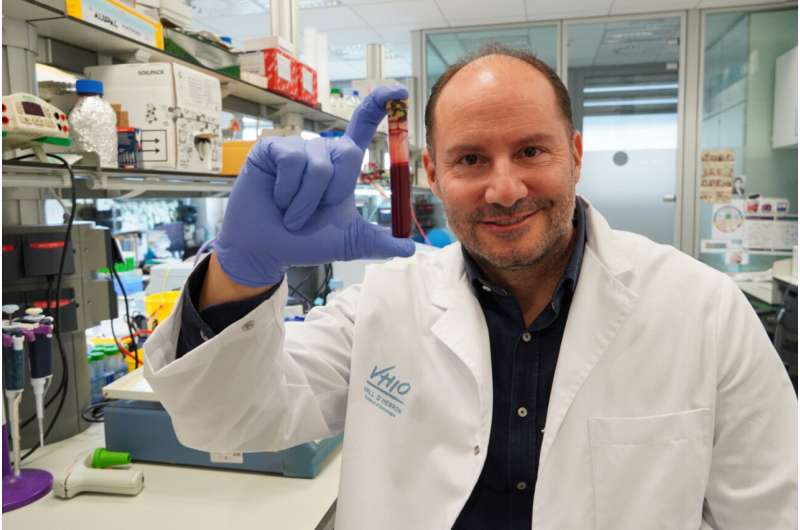This article has been reviewed according to Science X's editorial process and policies. Editors have highlighted the following attributes while ensuring the content's credibility:
fact-checked
peer-reviewed publication
proofread
Novel liquid biopsy approach shows 30% increased sensitivity in detecting tumor DNA in blood

Pancreatic cancer is the seventh-leading cause of cancer death worldwide, and despite the increasing incidence of this disease, effective treatments are lacking and prognosis for patients with this tumor type remains poor, with approximately 70% of patients dying within one year of diagnosis. Advancing insights into the evolution and intra-tumor heterogeneity of pancreatic cancer is therefore crucial in identifying new therapeutic targets against this disease.
"Characterizing the vulnerabilities and evolutionary dependencies of pancreatic cancer that could lead to the development of more effective targeted therapies represents an unmet and urgent need," says Rodrigo A. Toledo, Principal Investigator of the Vall d'Hebron Institute of Oncology's (VHIO) Biomarkers and Clonal Dynamics Group.
Published in Genome Medicine, a study co-led by Toledo and Manuel Hidalgo, Chief of the Division of Hematology and Medical Oncology at Weill Cornell Medicine/New York-Presbyterian Hospital (New York, U.S.), along with Nicholas McGranahan, Leader of the Cancer Genome Evolution Research Group at the Cancer Research UK Lung Cancer Centre of Excellence, University College London Cancer Institute (London, UK), reports on the development of a new liquid biopsy approach, ACT-Discover—Aneuploidy in Circulating Tumor DNA (ctDNA), and shows that this technique is 30% more sensitive than current methods in patients with advanced to
"ctDNA analysis by liquid biopsy prior to treatment and in series throughout the course of disease allows us to identify and track the genetic or molecular alterations that occur in the tumor and achieve a better understanding of pancreatic cancer. This technology is being increasingly applied across different tumor types to identify mutations that can greatly affect drug sensitivity and therefore help guide treatment decision making," Toledo, co-corresponding author of this present study and coordinator of the liquid biopsy working group of the CIBERONC Spanish Biomedical Research Centre in Cancer network.
"This non-invasive approach for tracking cancer in real time does, however, have certain limitations. One current challenge is that some tumors, including pancreatic cancer, do not release enough ctDNA into the bloodstream to be detected by current liquid biopsy approaches," adds Ana Belen Moreno, a Ph.D. student of Toledo's group.
Potentiating liquid biopsy in pancreatic cancer
Aimed at addressing this challenge in pancreatic cancer, the investigators sought to develop a more sensitive liquid biopsy technique to detect ctDNA in blood and analyze genomic and molecular characteristics of tumors over time to advance insights into the evolution of disease.
"We have now developed a new liquid biopsy tool, ACT-Discover, that integrates plasma analysis and also incorporates the patient's germline DNA and tumor DNA obtained from biopsy specimens or through patient-derived xenograft models and or ctDNA," says Teresa Macarulla, Principal Investigator of VHIO's Upper Gastrointestinal and Endocrine Tumors Group and co-author of this present study.
In a cohort of 24 patients with late-stage pancreatic cancer, the researchers used ACT-Discover to study the progression of disease. Using this new liquid biopsy methodology, they have shown that this more comprehensive approach can detect ctDNA in 30% more patients compared with conventional liquid biopsy.
"Being able to access genetic and genomic insights in a non-invasive way, and to do so in series throughout the course of disease, provides valuable information to deliver on the true promise of precision cancer medicine in an increasing number of tumor types, including pancreatic cancer," adds co-corresponding author Hidalgo.
"Our results underpin the importance of sampling approaches over time and across space in cancer as well as ctDNA-based approaches in tracking tumor evolution. Findings also highlight intra-tumor heterogeneity within advanced pancreatic cancer," concludes Toledo.
More information: Ariana Huebner et al, ACT-Discover: identifying karyotype heterogeneity in pancreatic cancer evolution using ctDNA, Genome Medicine (2023). DOI: 10.1186/s13073-023-01171-w



















